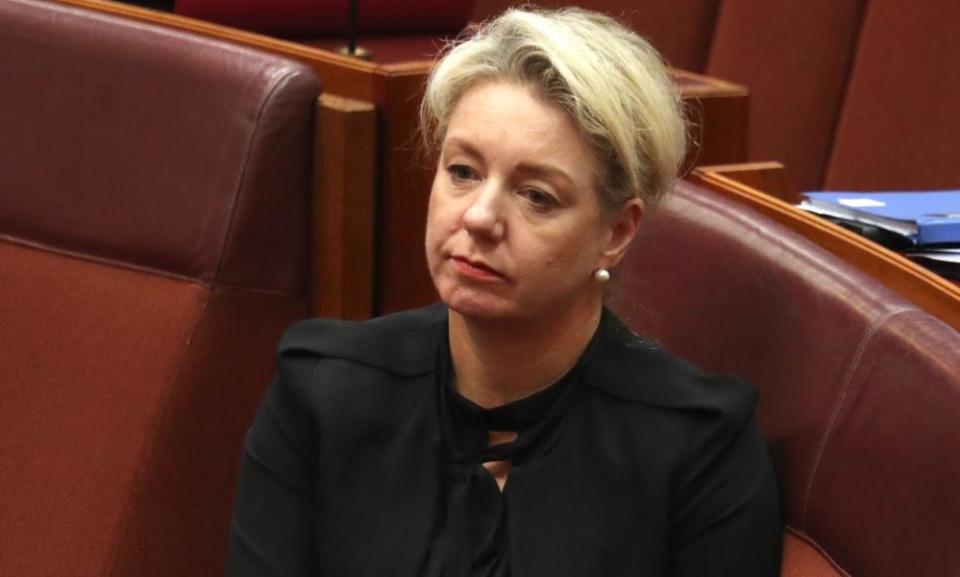Sports rorts inquiry accuses government of obstructing its investigation

An inquiry into the sports rorts scandal has accused the government of “obstruction” after the former minister, Bridget McKenzie, refused to appear and her successor blocked the release of advice about the legality of the $100m program.
In an interim report tabled on Tuesday, the Senate select committee rejected current sport minister Richard Colbeck’s public interest immunity claim that stopped Sport Australia from releasing legal advice about McKenzie’s authority to approve grants.
The Labor-Greens majority committee recommended the Senate set a deadline of Thursday morning for the government to provide the advice – a push the Senate agreed to when chair Anthony Chisholm tabled the report.
That sets up a standoff between the Senate and the government over the $100m community sport infrastructure grant program that was the subject of a scathing auditor general’s report. It found the program was skewed toward Coalition marginal and target seats.
In her written submission to the inquiry, McKenzie claimed her ministerial discretion resulted in more grants going to seats that were not classified as marginal or targeted.
Related: 'Beggars belief': women's office excluded from talks on $150m scheme to boost females in sport
But the committee’s interim report said the former sports minister “has so far yet to accept an invitation” to explain aspects of the program including “how the final list of grant recipients in round three was changed without her knowledge or approval”.
The auditor general also found it was “not evident” what McKenzie’s authority was to give sports grants. Independent legal experts have identified a number of legal issues with the CSIG program, including that there may be no constitutional power for the federal government to give sports grants and that McKenzie failed to formally direct Sport Australia to substitute her decisions for its own.
In February, the Sport Australia chair, John Wylie, said the agency had obtained legal advice about the program after the auditor general’s report and offered to provide it confidentially to the committee.
Sport Australia has claimed it had statutory authority to provide grants and was entitled to “take account” of which projects McKenzie wanted to be funded.
But when the committee asked for the advice underpinning that conclusion, Colbeck blocked its release, claiming public interest immunity and warning the advice might prejudice a federal court challenge by Beechworth Lawn Tennis Club against its grant refusal.
The committee report said that legal professional privilege was not a ground to refuse to provide the advice and Colbeck had failed to explain the potential harm to the public interest in disclosing it.
The report stated there was no precedent for a minister to block the release of information that Sport Australia, an independent statutory agency, had offered to provide.
It accused the government of a “systemic lack of disclosure [that] has materially obstructed the inquiry’s ability to properly scrutinise the governance of the program”.
In a dissenting report, Coalition senators Eric Abetz and Matt Canavan said the government was “well within its rights” to cite potential contempt of court to refuse to release the legal advice.
The Coalition members accused the non-government members of “politicising” the inquiry, including by “unnecessarily dragging it out” over 11 hearings to score points against the government. On Monday, the Senate authorised the inquiry to continue until March 2021.
Abetz and Canavan said the government was “committed to making further investments in sporting infrastructure and this inquiry has highlighted how many worthwhile projects there remain to be funded”.
Despite the prime minister, Scott Morrison, suggesting in January that clubs that missed out could yet be funded, the government did not allocate them any extra funding in the October budget.
Tabling the report, Chisholm told the Senate the government was preventing the inquiry from getting to the bottom of an “outrageous abuse of public funds”.
The committee’s deputy chair, Janet Rice, said it was an attempt to “cover up” how taxpayer funds were used to win votes at the 2019 election.

 Yahoo Finance
Yahoo Finance 